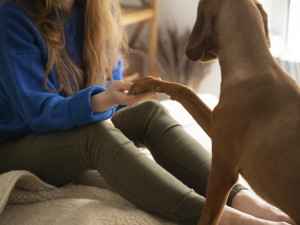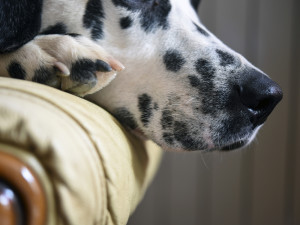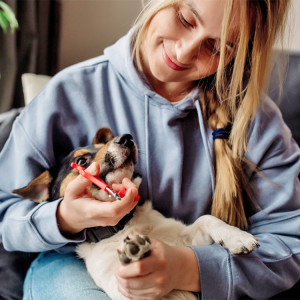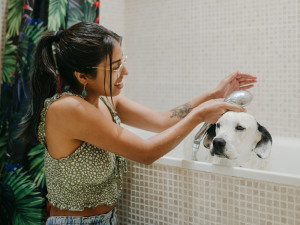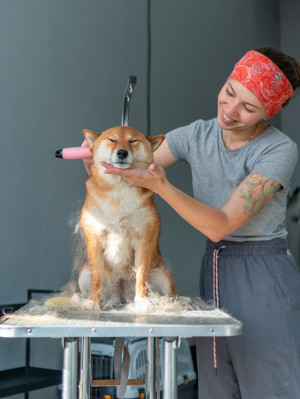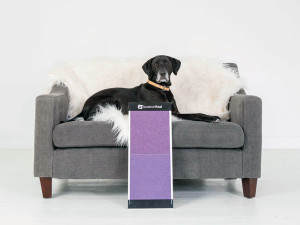Why Does My Dog Bite Their Nails?
Is that an OK habit for them to have?

Share Article
In This Article:
Why Do Dogs Bite Their Nails?opens in a new tab How Do I Get My Dog to Stop Chewing Their Nails?opens in a new tab Should You Go to the Vet Because of Your Dog’s Nail Biting?opens in a new tab Frequently Asked Questionsopens in a new tab
Pet parents see their dogs do a lot of weird things, like spinning in a circle before they lie down, sticking their noses in people’s crotches, or getting the zoomies after a bath. Sometimes, dogs are just being dogs with unique quirks and habits, but often, there is a reason for specific behaviors.
Nail biting is one of those. If your dog is biting their nails, it is likely for a reason, whether that’s anxiety, allergies, or nail length discomfort. If they are biting their nails excessively, consult a vet to rule out any underlying health issues.

littleKin™ is Kinship’s home just for puppy and kitten parents. Bop over to check out expert advice, new pet tools, and special deals—all curated for your newest family member.
opens in a new tabWhy do dogs bite their nails?
To explore some of the common reasons dogs might bite their nails, we consulted Lucia Lazarowski, CAAB, Chief Behavioral Scientist with Auburn University’s Canine Performance Sciences program, and Mary Huntsberry, ACAAB, owner of Helping Pets Behaveopens in a new tab.
Overgrown nails
A dog may chew their nails because they are overgrown. Nails that are left untrimmed can cause discomfortopens in a new tab, broken nails, and even mobility issues in dogs. If nails are so long that they are the first part of a dog’s foot that touches the ground, it can inhibit traction or alter the way the dog’s foot sits on the ground. When nails are overgrown and uncomfortable, dogs may chew or bite them to try to fix the discomfort, the same way they might lick a wound.
Broken nails
Another cause for dog nail chewing could be a nail injury, such as a broken nailopens in a new tab, that a dog is trying to fix or soothe. When a dog’s nail breaks, it can split up toward the toe, potentially exposing the quick and causing pain. An exposed quick can also become a risk for infection.
“If they break or they get something stuck in the nail, they’ll actually bite the nail themselves to fix it and that’s just a normal grooming type of behavior,” Lazarowski says.
Breaks are more common in overgrown nails, so pet parents can avoid unnecessary discomfort and risk of infections by keeping their dog’s nails trimmed.
Allergies
Dogs who lick or bite their paws may do so as result of environmental allergiesopens in a new tab. Just like humans, dogs can react to certain environmental allergens like pollen, mold spores, dust mites, grass, and more. Because their paws can be exposed to these allergens when dogs go outside or on walks, they may experience skin irritation on their paws and try to clean and soothe them by licking or nibblingopens in a new tab.
Infection
Dogs’ paws are regularly exposed to conditions that can lead to infection — just imagine what could happen to your toes if you spent an hour walking barefoot on a sidewalk. Infections can manifest in itchy and irritated skin, which dogs will often attempt to soothe and clean with their mouths. However, this behavior can make the infection worse, not better.
Anxiety
Dogs who are anxious may chew their nails as a self-soothing behavior. Observe when your dog engages in nail chewing. If it happens when they are left alone or when there is a change in surroundings, it may be due to anxiety. Look for other signs of anxietyopens in a new tab, such as excessive panting, pacing, or tense body posture.
“Sometimes it can be driven from anxiety, just like humans bite their nails as a stress relief or tension release,” Lazarowski says. “Dogs learn that by doing that, it’s relieving anxiety, then that becomes kind of self-rewarding and then they develop a habit and keep doing that.”
Disease or other medical conditions
Similar to an infection, a disease or other medical condition may be the cause of nail biting. Certain conditions, such as flea dermatitisopens in a new tab or demodectic mange, can cause irritation and itching around the paws.
“There are parasites that can cause dogs to want to chew at their skin and their paws are easily accessible to nibble at so there’s definitely sometimes a health-related reason,” Lazarowski says.
Keeping your dog up-to-date on their heartworm, flea and tick, and other preventative medications opens in a new taband visiting the vet regularly can prevent some diseases and medical conditions before they occur.
How do I get my dog to stop chewing their nails?
Like many dog behaviors, a few seconds of nail biting or chewing can be okay. It’s when it becomes excessive that there’s a problem. If your dog is chewing their nails excessively, you are probably better off consulting a vet before taking matters into your own hands.
“Since joint pain, allergies, yeast, etc. can infiltrate the forelegs and paws, it is important that the pet receive veterinary evaluation before assuming the cause is behavioral,” Huntsberry says.
If you’ve ruled out an underlying medical condition, the following strategies may help curb the behavior:
Give your dog something else to chew on
If your dog seems to be chewing their nails as a self-soothing behavior, find something else that provides the same stress relief, like a chew toy or an interactive mental toy.
“There are puzzle feeders or toys you can stuff with kibble so instead of your dog relieving boredom or anxiety by chewing their own nails, they can manipulate something else that’s more appropriate, giving them something else to do,” Lazarowski says.
Trim your dog’s nails
For dogs who resort to nail chewing because their nails are overgrown, keeping them trimmed may be a solution. Trimming your dog’s nailsopens in a new tab can be challenging, since many dogs are afraid of it. Lazarowski suggests early exposure so that puppies get used to nail clippers and don’t become afraid:
“You can introduce it very gradually by just showing them the clippers and giving them some treats,” she says. “They learn that the clippers are nothing scary. Then gradually progress to touching their paws with the clippers, and if they’re allowing that and not seeming to get nervous or stressed out, you can progress through the steps towards actually clipping their nails, meanwhile always giving them treats and positive association.”
When trimming a dog’s nails, be careful not to cut too far, or you risk cutting their quick, the inner part of the nail that can cause pain and bleeding if cutopens in a new tab. Note that the quick grows with the nail, so it can become lengthy if the nails aren’t regularly trimmed, which can make it difficult to cut your dog’s nails short without injuring them. Getting your dog on a nail maintenance schedule and trimming every three to four weeks can train the quick to retract and allow you to keep your dog’s nails short.
When in doubt, consult a professional. Groomers are usually very experienced in trimming nails and can make the experience less stressful for you and your pup. Some groomers may use a dremel, a tool that grinds the nails down gradually as opposed to clipping them. Depending on the dog, this may be less fear-inducing than a clipper.
Wash your dog’s feet
You can try washing your dog’s feet to prevent nail chewing. This may be especially effective for dogs who are biting their nails because of allergies or having something stuck in their paw. Observe your dog to see when they begin chewing. If it usually happens after being outside or on a walk, try washing their feet when they come inside to see if that solves the issue.
Exercise
If the reason your dog is chewing their nails is anxiety, exercise may be a positive outlet for that anxious energy. As the saying goes, a tired dog is a good dog. Make sure they are getting plenty of walks, fetch, and stimulation to ensure their minds and bodies are tired enough that they don’t turn to nail biting or other anxiety-driven behaviors.
Should you go to the vet because of your dog’s nail biting?
Because dogs usually bite their nails for a reason, it is a good idea to consult a veterinarian to rule out any underlying health issues. Nail biting may be a sign of parasites, anxiety, allergies, or some other issue that needs to be addressed. Waiting to go to the vet, or assuming nail biting is just a quirky habit of your dog and not taking action, could cause the issue to get worse.
Huntsberry advises watching for how long your dog participates in the behavior: “Biting and chewing nails is not a normal behavior for dogs,” she says. “Aside from self-cleaning, any licking or chewing past 10 to 15 seconds is usually a sign of a medical condition.”
FAQs
How do I get my dog to stop chewing their nails?
Your dog is likely chewing their nails for a reason. Identify the underlying issue and work with a veterinarian to treat the problem. For example, if they are chewing their nails because they are overgrown, start a nail trimming routine.
Is it normal for a dog to chew their nails?
Nail chewing in excess is not a normal behavior and is likely signaling an underlying problem, such as allergies, overgrown nails, or an infection. If your dog is excessively chewing their nails, consult a veterinarian.
Should I bring my dog to the vet if they are biting their nails?
If your dog is excessively biting their nails, you should consult a veterinarian. If your dog is only biting their nails occasionally for a few seconds and they are not causing damage to their paws, they might not need a vet. If you can identify the cause, you can try to resolve it yourself, for example, by trimming their nails or washing their paws.
References
Arhant, Christine, et al. “Chewing Behaviour in Dogs – a Survey-Based Exploratory Study.” Applied Animal Behaviour Science, vol. 241, Aug. 2021, p. 105372, https://doi.org/10.1016/j.applanim.2021.105372opens in a new tab.
Markey, Nathan. “Trimming Dogs’ Nails | Why It’s Important & Tips for Anxiety.” Tier 1 Veterinary Medical Center, 15 Feb. 2021, tier1vet.com/trimming-dogs-nails/opens in a new tab.
Weir, Malcolm, et al. “Allergies in Dogs.” Vca_corporate, vcahospitals.com/know-your-pet/allergy-general-in-dogsopens in a new tab.

Missy Schrott Boylan
Missy Schrott Boylan is a writer specializing in pets, child welfare, and community journalism. Her pets writing has been featured in People, The Spruce Pets, and The Canine Review. Missy also enjoys photography, with her star subject being her five-year-old corgi, Charlotte.
Related articles
![woman smiling while trimming dog’s nails]() opens in a new tab
opens in a new tabWhat Are the Best Dog Nail Clippers?
Finally—you won’t dread at-home grooming time.
![Woman carefully cleaning a dog in a bathtub.]() opens in a new tab
opens in a new tabHow to Groom Your Dog at Home: the Complete Guide
Spa days can happen at home.
- opens in a new tab
Why Does My Dog Scratch the Bed?
And why the scratching sessions seem never-ending.
- opens in a new tab
How Often Should You Groom Your Dog?
Just make sure you spell out “B-A-T-H.”
- opens in a new tab
Why Does My Dog Scratch My Bed Sheets?
![Black Labrador dog sitting on a white fur blanket on a gray couch that has a purple rectangular ScratchPad leaning on the front]() opens in a new tab
opens in a new tabMiss Independent? Let Your Dog Trim Their Own Nails
ScratchPad is a less stressful solution to claw care for DIY pups.
